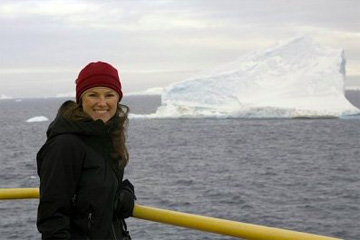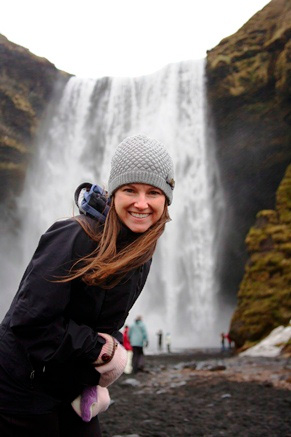Susan Cosier is a senior editor for Audubon, as well as running the magazine’s Green Guru column where she answers readers’ questions about how to live life in ways which are environmentally responsible. Susan studied environmental science as an undergrad at Wesleyan University, then went to NYU where she earned a Master of Arts in Science in the Science, Health, and Environmental Reporting Program. Her work has appeared in E/The Environmental Magazine, Wildlife Conservation, Utne Reader, and Scientific American MIND. Susan lives in Brooklyn, NY, and when she’s not writing about interesting things, she enjoys running, reading, traveling, and trying to learn Spanish.
Morgan Erickson-Davis: How did you get your start as a writer?
 Susan Cosier |
Susan Cosier: My career as a writer really began when I was studying science as an undergrad.
I was forced to explain complex systems clearly, an obligation that I hardly
appreciated at the time. After college, I went to work for the government, a move
that greatly expanded my knowledge base when it came to the environment
and the laws surrounding its protection. I was really yearning to increase my
understanding of more science, though, and decided to get my master’s degree in
the Science, Health, and Environmental Reporting Program at New York University.
There I delved into a multitude of topics, absorbing as much as I could and slowly
learning what it takes to find, develop, and write a compelling narrative. I threw
myself into issues I could devour. I ate only foods grown or produced within 100
miles of my Brooklyn apartment; I toured green roofs to see first-hand how they
reduce runoff; and I talked with experts about the debate surrounding how—or
if—we can eradicate the Ebola virus. My first professional journalism job was at
an environmental lifestyle publication, Plenty, and from there, I came to Audubon
magazine.
Morgan Erickson-Davis: What conservation issues most interest you?
Susan Cosier: A better question might be what conservation issues don’t interest me. I’m
particularly keen on covering how we’re going to balance our need and desire
for energy with preserving rich and important habitat. I’m also a sucker for
conservation success stories—those tales of passionate individuals who work
tirelessly to bring a species or an ecosystem back from the brink of extinction or
destruction. Combining the scientific endeavor with conservation—meaning finding
a way to preserve habitat while working with local people—is fascinating to me, as
is green travel, which, if done correctly, might offer conservation options previously
unexplored. What else? Chemicals in our environment, the consequences of global
warming, uncovering the complexities of life and ecosystems on the planet all grab
my attention, too. I could name so many more, but I don’t want to bore your readers.
Morgan Erickson-Davis: A few years ago, you tried a “100-mile” diet. Was it difficult to source food from within 100 miles of Brooklyn? What
did you do in the winter? Do you still eat locally?
Susan Cosier: When I was reporting my 100-mile diet story, I bought a lot of my food at
farmers’ markets. Thankfully there are a number of those in New York that
encourage nearby farmers to sell their produce in the city. I found myself
going from one place to another, picking out products sold in specialty
stores that catered to people looking to support their local producers.
It was an eye-opening experience to learn about what is grown in or
flown into my region, and how our decisions—when we do something as
simple as go to the grocery store—affect the urban environment and its
surroundings.
Morgan Erickson-Davis: With all the dire predictions and depressing situations of the
environmental beat, it’s sometimes difficult to keep an eye on the
positive things. Yet it’s so important to keep them in mind. Of the success
stories you’ve covered, have any in particular stuck with you? What are
some of your favorites?
 Susan Cosier |
Susan Cosier: Every time that I come across a positive story it stays with me somehow. I
wrote a piece about a reserve in Peru where a biologist has been working
for decades to ensure the conservation of wildlife and the local people.
After a number of failed attempts, he and his team succeeded by working
with the people who live there. Now he is seen as someone who adapted
a model to benefit a unique and beautiful ecosystem. Another story
that comes to mind is one that I wrote about young men who worked to
preserve rosy-finches. After tragedy struck, a group continued the efforts
in the name of the lost friend. Their work could help researchers see how
global warming is affecting alpine species. It was a really personal story that
the community shared with me, and there are some really heartwarming
aspects to it.
Morgan Erickson-Davis: You recently wrote an article about nature-centered preschool
programs, and how they simultaneously inspire interest in conservation
while promoting brain development. It was fascinating to read about how
just 20 minutes spent outdoors can so substantially counteract ADHD
in young kids. What inspired you to write this story and what have you
learned from it?
Susan Cosier: There’s a growing body of evidence that time spent outdoors is beneficial
to both physical and mental health. One of the things that motivated me
to delve into this topic is what the teachers at the Schlitz Audubon Nature
Preschool are finding. There are only a few schools that have adopted this
curriculum of allowing children to explore their surroundings all day, yet it
seems to be a model that will become more popular as educators see how
valuable it is to expanding minds.
Every story frames the world in a slightly different way, and this piece was
no different. It taught me the value of exploring and learning about the
world around us, and how those lessons lead to others that are difficult to
quantify until later in life. Another thing that this story shows me is that a
few individuals who are passionate about a particular topic like education
and the outdoors can inspire and motivate others.
Morgan Erickson-Davis: What would you say is the most important thing you’ve learned about
environmental writing?
Susan Cosier: I think that what’s true of most writing pertains to environmental writing.
Environmental writers have this vast group of scientists to draw upon when looking
for and developing ideas, but one of the most important things is to take the reader
on a journey when a writer finishes his or her research and tackles the writing
process. Covering the research results of a study (or studies) on chemicals, for
example, and turning the findings into a riveting story can take some time, effort,
and poetry. On the occasion that you can do it, though, it feels like everything is right
in the universe. It’s hard for anyone to put down a story that keeps you wanting
more.
Morgan Erickson-Davis: Any advice for aspiring environmental writers?
Susan Cosier: If I were to give any advice, it would be to do two things: keep asking questions
and take the initiative to turn what you find into great stories. I can be talking to
someone for half an hour when they mention something off-topic that makes you
stop and say, what? Little snippets of an interview or a conversation with a friend,
even, can lead to captivating stories. But the only way those stories are going to
be told is if you pitch them, develop them, and turn them into something really
wonderful that your editor can’t say no to and that your readers, or listeners, or
watchers, will love. Even if an editor does say no, try it anyway, if only for yourself.
Write a draft, make an audio file, or shoot a video. Not every project is going to be
a success, but one might turn out to be great, and even with the ones the flop, you
might learn a ton in the process.
Specifically to environmental writers, I’d say don’t be afraid to ask easy questions
like, what does that mean? How would you define that? Can you describe that
process? Like everything in science, environmental issues can be complex, so when
you’re interviewing a source, ask about the basics and try to come up with analogies
that might make the study, issue, or process easier to understand to your readers,
who can then contribute to the environmental conversation, too.
You can learn more about Susan and her pursuits by visiting her website and checking out her Twitter feed.
Related articles